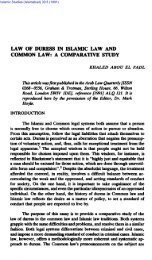THE ECONOMIC DILEMMA OF THE MUSLIM WORLD
THE ECONOMIC DILEMMA OF THE MUSLIM WORLD
THE ECONOMIC DILEMMA OF THE MUSLIM WORLD
You also want an ePaper? Increase the reach of your titles
YUMPU automatically turns print PDFs into web optimized ePapers that Google loves.
Islamic Studies 35 : 3 ( 1 996) 30 1<br />
the two economic spheres, that nothing has changed in the conscience of the<br />
northern man. He continues to follow the creed of Liebniz5 who, while laying<br />
down the new basis for methametics, also meditated on the occupation of Egypt<br />
and presented on this account a detailed report to Louis X1V.6 He also<br />
continues to follow the creed of Ernest Renan7 who saw that the "European is<br />
born to command just as the Chinese is born to work in a slave camp, and each<br />
must do what he is created Ibr." Hence the substitution of the sword with the<br />
olive branch has changed nothing but the appearance.<br />
Europe which in the 1 1 th century had forged an alliance to conduct the<br />
Crusadesn and, in 1881, entered into a colonial pact in Berlin, under Bismarck'sY<br />
supervision, for the imperialist onslaught, has today turned itself once again into<br />
a bloc in the form of the "Conunon Market". Apparently constituted to resist the<br />
challenge posed by U.S., Japan and China, it has actually come into being for<br />
launching an economic offensive against the former spheres of European<br />
influence in order to plant therein new pillars of their presence through<br />
economic means.<br />
Accordingly, it behoves anyone concerned with the economic revival<br />
of a Muslim country or Muslim world in general, to take into consideration<br />
internal imperatives some of whose features we have indicated earlier. Likewise,<br />
he must also take into consideration the external imperatives as indicated here.<br />
We must first clarify the logic of the issue by asking: What are the<br />
limits of individual capabilities - we mean to say, with regard to his country<br />
alone - to face internal and external imperatives? That is to say, we must know<br />
clearly the limits of our freedom of action internally, within the framework of<br />
harnessing social energies on the basis of the two postulates mentioned earlier<br />
as essential conditions for setting the wheel of economic dynamics in motion,<br />
and on the other hand, in resisting economic penetration from outside.<br />
It must be noted that only a few countries, like the U.S., the Soviet<br />
Union and China, fulfil the conditions of autarky. For example, U .S consumes<br />
95% of its production within its own frontiers. It me'ms that if it broke off all<br />
economic relations with the outside world, only 5% of its economy or work<br />
force would be affected. In other words, the United States enjoys almost<br />
absolute economic freedom on account of the vastness of its area and its<br />
demographic base, that is, its affluence from the point of view of natural wealth<br />
and human resources.<br />
After the Cultural Revolution, China has become another country which<br />
can harmlessly break off economic relations with he outside world, by means<br />
of the austerity imposed by current internal imperatives in the take-off stage it<br />
is still passing through. Likewise, the Soviet Union can do so less easily than<br />
the United States but more easily than China. As for all other countries, they<br />
cannot resolve all their economic problems within their particular frontiers.<br />
Despite being the third economic power. Japan cannot afford to cut off<br />
its ties with the outside world. That is to say, it cannot form a closed economic<br />
circle within its frontiers except, like Germany, in rare circumstances. The latter
















